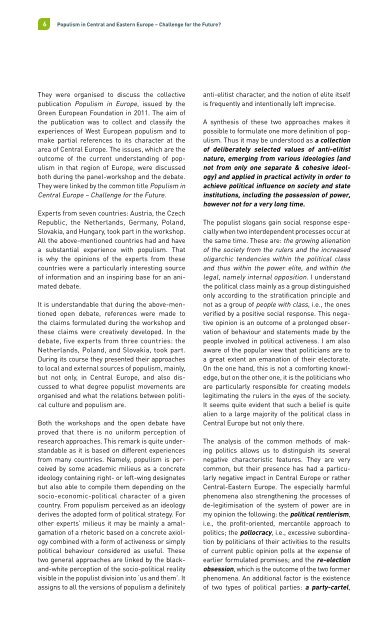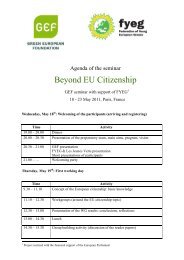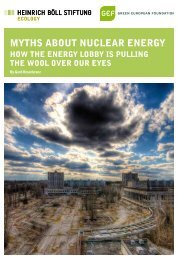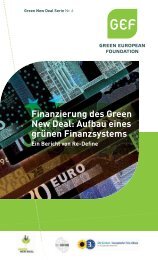Populism in Central and Eastern Europe â Challenge for the Future?
Populism in Central and Eastern Europe â Challenge for the Future?
Populism in Central and Eastern Europe â Challenge for the Future?
- No tags were found...
Create successful ePaper yourself
Turn your PDF publications into a flip-book with our unique Google optimized e-Paper software.
6 <strong>Populism</strong> <strong>in</strong> <strong>Central</strong> <strong>and</strong> <strong>Eastern</strong> <strong>Europe</strong> – <strong>Challenge</strong> <strong>for</strong> <strong>the</strong> <strong>Future</strong><br />
They were organised to discuss <strong>the</strong> collective<br />
publication <strong>Populism</strong> <strong>in</strong> <strong>Europe</strong>, issued by <strong>the</strong><br />
Green <strong>Europe</strong>an Foundation <strong>in</strong> 2011. The aim of<br />
<strong>the</strong> publication was to collect <strong>and</strong> classify <strong>the</strong><br />
experiences of West <strong>Europe</strong>an populism <strong>and</strong> to<br />
make partial references to its character at <strong>the</strong><br />
area of <strong>Central</strong> <strong>Europe</strong>. The issues, which are <strong>the</strong><br />
outcome of <strong>the</strong> current underst<strong>and</strong><strong>in</strong>g of populism<br />
<strong>in</strong> that region of <strong>Europe</strong>, were discussed<br />
both dur<strong>in</strong>g <strong>the</strong> panel-workshop <strong>and</strong> <strong>the</strong> debate.<br />
They were l<strong>in</strong>ked by <strong>the</strong> common title <strong>Populism</strong> <strong>in</strong><br />
<strong>Central</strong> <strong>Europe</strong> – <strong>Challenge</strong> <strong>for</strong> <strong>the</strong> <strong>Future</strong>.<br />
Experts from seven countries: Austria, <strong>the</strong> Czech<br />
Republic, <strong>the</strong> Ne<strong>the</strong>rl<strong>and</strong>s, Germany, Pol<strong>and</strong>,<br />
Slovakia, <strong>and</strong> Hungary, took part <strong>in</strong> <strong>the</strong> workshop.<br />
All <strong>the</strong> above-mentioned countries had <strong>and</strong> have<br />
a substantial experience with populism. That<br />
is why <strong>the</strong> op<strong>in</strong>ions of <strong>the</strong> experts from <strong>the</strong>se<br />
countries were a particularly <strong>in</strong>terest<strong>in</strong>g source<br />
of <strong>in</strong><strong>for</strong>mation <strong>and</strong> an <strong>in</strong>spir<strong>in</strong>g base <strong>for</strong> an animated<br />
debate.<br />
It is underst<strong>and</strong>able that dur<strong>in</strong>g <strong>the</strong> above-mentioned<br />
open debate, references were made to<br />
<strong>the</strong> claims <strong>for</strong>mulated dur<strong>in</strong>g <strong>the</strong> workshop <strong>and</strong><br />
<strong>the</strong>se claims were creatively developed. In <strong>the</strong><br />
debate, five experts from three countries: <strong>the</strong><br />
Ne<strong>the</strong>rl<strong>and</strong>s, Pol<strong>and</strong>, <strong>and</strong> Slovakia, took part.<br />
Dur<strong>in</strong>g its course <strong>the</strong>y presented <strong>the</strong>ir approaches<br />
to local <strong>and</strong> external sources of populism, ma<strong>in</strong>ly,<br />
but not only, <strong>in</strong> <strong>Central</strong> <strong>Europe</strong>, <strong>and</strong> also discussed<br />
to what degree populist movements are<br />
organised <strong>and</strong> what <strong>the</strong> relations between political<br />
culture <strong>and</strong> populism are.<br />
Both <strong>the</strong> workshops <strong>and</strong> <strong>the</strong> open debate have<br />
proved that <strong>the</strong>re is no uni<strong>for</strong>m perception of<br />
research approaches. This remark is quite underst<strong>and</strong>able<br />
as it is based on different experiences<br />
from many countries. Namely, populism is perceived<br />
by some academic milieus as a concrete<br />
ideology conta<strong>in</strong><strong>in</strong>g right- or left-w<strong>in</strong>g designates<br />
but also able to compile <strong>the</strong>m depend<strong>in</strong>g on <strong>the</strong><br />
socio-economic-political character of a given<br />
country. From populism perceived as an ideology<br />
derives <strong>the</strong> adopted <strong>for</strong>m of political strategy. For<br />
o<strong>the</strong>r experts’ milieus it may be ma<strong>in</strong>ly a amalgamation<br />
of a rhetoric based on a concrete axiology<br />
comb<strong>in</strong>ed with a <strong>for</strong>m of activeness or simply<br />
political behaviour considered as useful. These<br />
two general approaches are l<strong>in</strong>ked by <strong>the</strong> black<strong>and</strong>-white<br />
perception of <strong>the</strong> socio-political reality<br />
visible <strong>in</strong> <strong>the</strong> populist division <strong>in</strong>to ‘us <strong>and</strong> <strong>the</strong>m’. It<br />
assigns to all <strong>the</strong> versions of populism a def<strong>in</strong>itely<br />
anti-elitist character, <strong>and</strong> <strong>the</strong> notion of elite itself<br />
is frequently <strong>and</strong> <strong>in</strong>tentionally left imprecise.<br />
A syn<strong>the</strong>sis of <strong>the</strong>se two approaches makes it<br />
possible to <strong>for</strong>mulate one more def<strong>in</strong>ition of populism.<br />
Thus it may be understood as a collection<br />
of deliberately selected values of anti-elitist<br />
nature, emerg<strong>in</strong>g from various ideologies (<strong>and</strong><br />
not from only one separate & cohesive ideology)<br />
<strong>and</strong> applied <strong>in</strong> practical activity <strong>in</strong> order to<br />
achieve political <strong>in</strong>fluence on society <strong>and</strong> state<br />
<strong>in</strong>stitutions, <strong>in</strong>clud<strong>in</strong>g <strong>the</strong> possession of power,<br />
however not <strong>for</strong> a very long time.<br />
The populist slogans ga<strong>in</strong> social response especially<br />
when two <strong>in</strong>terdependent processes occur at<br />
<strong>the</strong> same time. These are: <strong>the</strong> grow<strong>in</strong>g alienation<br />
of <strong>the</strong> society from <strong>the</strong> rulers <strong>and</strong> <strong>the</strong> <strong>in</strong>creased<br />
oligarchic tendencies with<strong>in</strong> <strong>the</strong> political class<br />
<strong>and</strong> thus with<strong>in</strong> <strong>the</strong> power elite, <strong>and</strong> with<strong>in</strong> <strong>the</strong><br />
legal, namely <strong>in</strong>ternal opposition. I underst<strong>and</strong><br />
<strong>the</strong> political class ma<strong>in</strong>ly as a group dist<strong>in</strong>guished<br />
only accord<strong>in</strong>g to <strong>the</strong> stratification pr<strong>in</strong>ciple <strong>and</strong><br />
not as a group of people with class, i.e., <strong>the</strong> ones<br />
verified by a positive social response. This negative<br />
op<strong>in</strong>ion is an outcome of a prolonged observation<br />
of behaviour <strong>and</strong> statements made by <strong>the</strong><br />
people <strong>in</strong>volved <strong>in</strong> political activeness. I am also<br />
aware of <strong>the</strong> popular view that politicians are to<br />
a great extent an emanation of <strong>the</strong>ir electorate.<br />
On <strong>the</strong> one h<strong>and</strong>, this is not a com<strong>for</strong>t<strong>in</strong>g knowledge,<br />
but on <strong>the</strong> o<strong>the</strong>r one, it is <strong>the</strong> politicians who<br />
are particularly responsible <strong>for</strong> creat<strong>in</strong>g models<br />
legitimat<strong>in</strong>g <strong>the</strong> rulers <strong>in</strong> <strong>the</strong> eyes of <strong>the</strong> society.<br />
It seems quite evident that such a belief is quite<br />
alien to a large majority of <strong>the</strong> political class <strong>in</strong><br />
<strong>Central</strong> <strong>Europe</strong> but not only <strong>the</strong>re.<br />
The analysis of <strong>the</strong> common methods of mak<strong>in</strong>g<br />
politics allows us to dist<strong>in</strong>guish its several<br />
negative characteristic features. They are very<br />
common, but <strong>the</strong>ir presence has had a particularly<br />
negative impact <strong>in</strong> <strong>Central</strong> <strong>Europe</strong> or ra<strong>the</strong>r<br />
<strong>Central</strong>-<strong>Eastern</strong> <strong>Europe</strong>. The especially harmful<br />
phenomena also streng<strong>the</strong>n<strong>in</strong>g <strong>the</strong> processes of<br />
de-legitimisation of <strong>the</strong> system of power are <strong>in</strong><br />
my op<strong>in</strong>ion <strong>the</strong> follow<strong>in</strong>g: <strong>the</strong> political rentierism,<br />
i.e., <strong>the</strong> profit-oriented, mercantile approach to<br />
politics; <strong>the</strong> pollocracy, i.e., excessive subord<strong>in</strong>ation<br />
by politicians of <strong>the</strong>ir activities to <strong>the</strong> results<br />
of current public op<strong>in</strong>ion polls at <strong>the</strong> expense of<br />
earlier <strong>for</strong>mulated promises; <strong>and</strong> <strong>the</strong> re-election<br />
obsession, which is <strong>the</strong> outcome of <strong>the</strong> two <strong>for</strong>mer<br />
phenomena. An additional factor is <strong>the</strong> existence<br />
of two types of political parties: a party-cartel,










